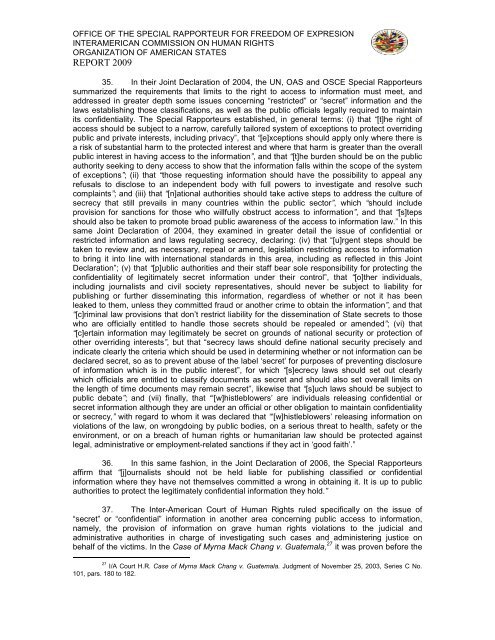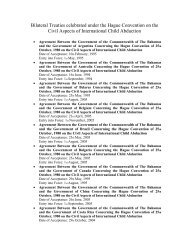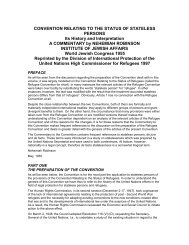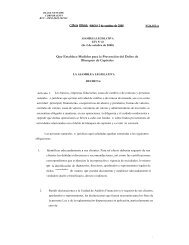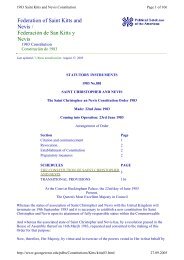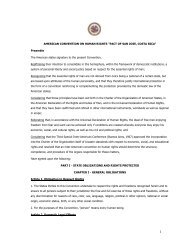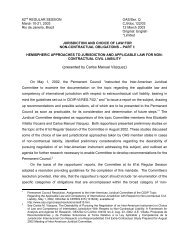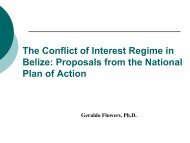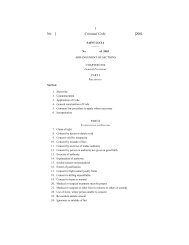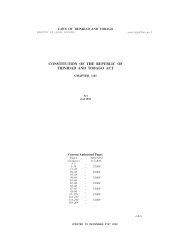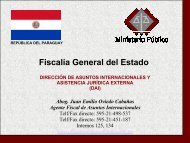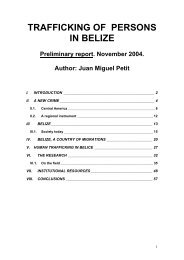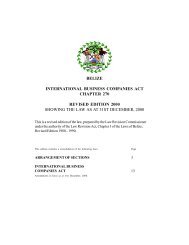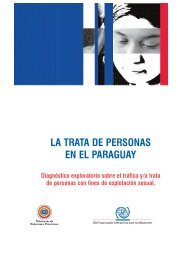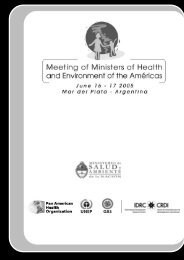The right of access to information Special Rapporteurship for ... - OAS
The right of access to information Special Rapporteurship for ... - OAS
The right of access to information Special Rapporteurship for ... - OAS
Create successful ePaper yourself
Turn your PDF publications into a flip-book with our unique Google optimized e-Paper software.
OFFICE OF THE SPECIAL RAPPORTEUR FOR FREEDOM OF EXPRESION<br />
INTERAMERICAN COMMISSION ON HUMAN RIGHTS<br />
ORGANIZATION OF AMERICAN STATES<br />
REPORT 2009<br />
35. In their Joint Declaration <strong>of</strong> 2004, the UN, <strong>OAS</strong> and OSCE <strong>Special</strong> Rapporteurs<br />
summarized the requirements that limits <strong>to</strong> the <strong>right</strong> <strong>to</strong> <strong>access</strong> <strong>to</strong> <strong>in<strong>for</strong>mation</strong> must meet, and<br />
addressed in greater depth some issues concerning “restricted” or “secret” <strong>in<strong>for</strong>mation</strong> and the<br />
laws establishing those classifications, as well as the public <strong>of</strong>ficials legally required <strong>to</strong> maintain<br />
its confidentiality. <strong>The</strong> <strong>Special</strong> Rapporteurs established, in general terms: (i) that “[t]he <strong>right</strong> <strong>of</strong><br />
<strong>access</strong> should be subject <strong>to</strong> a narrow, carefully tailored system <strong>of</strong> exceptions <strong>to</strong> protect overriding<br />
public and private interests, including privacy”, that “[e]xceptions should apply only where there is<br />
a risk <strong>of</strong> substantial harm <strong>to</strong> the protected interest and where that harm is greater than the overall<br />
public interest in having <strong>access</strong> <strong>to</strong> the <strong>in<strong>for</strong>mation</strong>”, and that “[t]he burden should be on the public<br />
authority seeking <strong>to</strong> deny <strong>access</strong> <strong>to</strong> show that the <strong>in<strong>for</strong>mation</strong> falls within the scope <strong>of</strong> the system<br />
<strong>of</strong> exceptions”; (ii) that “those requesting <strong>in<strong>for</strong>mation</strong> should have the possibility <strong>to</strong> appeal any<br />
refusals <strong>to</strong> disclose <strong>to</strong> an independent body with full powers <strong>to</strong> investigate and resolve such<br />
complaints”; and (iii) that “[n]ational authorities should take active steps <strong>to</strong> address the culture <strong>of</strong><br />
secrecy that still prevails in many countries within the public sec<strong>to</strong>r”, which “should include<br />
provision <strong>for</strong> sanctions <strong>for</strong> those who willfully obstruct <strong>access</strong> <strong>to</strong> <strong>in<strong>for</strong>mation</strong>”, and that “[s]teps<br />
should also be taken <strong>to</strong> promote broad public awareness <strong>of</strong> the <strong>access</strong> <strong>to</strong> <strong>in<strong>for</strong>mation</strong> law.” In this<br />
same Joint Declaration <strong>of</strong> 2004, they examined in greater detail the issue <strong>of</strong> confidential or<br />
restricted <strong>in<strong>for</strong>mation</strong> and laws regulating secrecy, declaring: (iv) that “[u]rgent steps should be<br />
taken <strong>to</strong> review and, as necessary, repeal or amend, legislation restricting <strong>access</strong> <strong>to</strong> <strong>in<strong>for</strong>mation</strong><br />
<strong>to</strong> bring it in<strong>to</strong> line with international standards in this area, including as reflected in this Joint<br />
Declaration”; (v) that “[p]ublic authorities and their staff bear sole responsibility <strong>for</strong> protecting the<br />
confidentiality <strong>of</strong> legitimately secret <strong>in<strong>for</strong>mation</strong> under their control”, that “[o]ther individuals,<br />
including journalists and civil society representatives, should never be subject <strong>to</strong> liability <strong>for</strong><br />
publishing or further disseminating this <strong>in<strong>for</strong>mation</strong>, regardless <strong>of</strong> whether or not it has been<br />
leaked <strong>to</strong> them, unless they committed fraud or another crime <strong>to</strong> obtain the <strong>in<strong>for</strong>mation</strong>”, and that<br />
“[c]riminal law provisions that don’t restrict liability <strong>for</strong> the dissemination <strong>of</strong> State secrets <strong>to</strong> those<br />
who are <strong>of</strong>ficially entitled <strong>to</strong> handle those secrets should be repealed or amended”; (vi) that<br />
“[c]ertain <strong>in<strong>for</strong>mation</strong> may legitimately be secret on grounds <strong>of</strong> national security or protection <strong>of</strong><br />
other overriding interests”, but that “secrecy laws should define national security precisely and<br />
indicate clearly the criteria which should be used in determining whether or not <strong>in<strong>for</strong>mation</strong> can be<br />
declared secret, so as <strong>to</strong> prevent abuse <strong>of</strong> the label ‘secret’ <strong>for</strong> purposes <strong>of</strong> preventing disclosure<br />
<strong>of</strong> <strong>in<strong>for</strong>mation</strong> which is in the public interest”, <strong>for</strong> which “[s]ecrecy laws should set out clearly<br />
which <strong>of</strong>ficials are entitled <strong>to</strong> classify documents as secret and should also set overall limits on<br />
the length <strong>of</strong> time documents may remain secret”, likewise that “[s]uch laws should be subject <strong>to</strong><br />
public debate”; and (vii) finally, that “‘[w]histleblowers’ are individuals releasing confidential or<br />
secret <strong>in<strong>for</strong>mation</strong> although they are under an <strong>of</strong>ficial or other obligation <strong>to</strong> maintain confidentiality<br />
or secrecy,” with regard <strong>to</strong> whom it was declared that “‘[w]histleblowers’ releasing <strong>in<strong>for</strong>mation</strong> on<br />
violations <strong>of</strong> the law, on wrongdoing by public bodies, on a serious threat <strong>to</strong> health, safety or the<br />
environment, or on a breach <strong>of</strong> human <strong>right</strong>s or humanitarian law should be protected against<br />
legal, administrative or employment-related sanctions if they act in ‘good faith’.”<br />
36. In this same fashion, in the Joint Declaration <strong>of</strong> 2006, the <strong>Special</strong> Rapporteurs<br />
affirm that “[j]ournalists should not be held liable <strong>for</strong> publishing classified or confidential<br />
<strong>in<strong>for</strong>mation</strong> where they have not themselves committed a wrong in obtaining it. It is up <strong>to</strong> public<br />
authorities <strong>to</strong> protect the legitimately confidential <strong>in<strong>for</strong>mation</strong> they hold.”<br />
37. <strong>The</strong> Inter-American Court <strong>of</strong> Human Rights ruled specifically on the issue <strong>of</strong><br />
“secret” or “confidential” <strong>in<strong>for</strong>mation</strong> in another area concerning public <strong>access</strong> <strong>to</strong> <strong>in<strong>for</strong>mation</strong>,<br />
namely, the provision <strong>of</strong> <strong>in<strong>for</strong>mation</strong> on grave human <strong>right</strong>s violations <strong>to</strong> the judicial and<br />
administrative authorities in charge <strong>of</strong> investigating such cases and administering justice on<br />
behalf <strong>of</strong> the victims. In the Case <strong>of</strong> Myrna Mack Chang v. Guatemala, 27 it was proven be<strong>for</strong>e the<br />
27 I/A Court H.R. Case <strong>of</strong> Myrna Mack Chang v. Guatemala. Judgment <strong>of</strong> November 25, 2003, Series C No.<br />
101, pars. 180 <strong>to</strong> 182.


